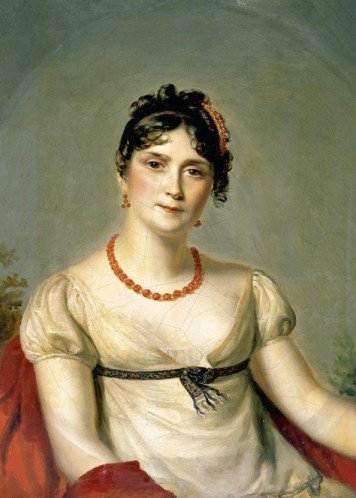 |
| Empress Josephine by Robert Lefevre, ca. 1805 [source] |
The Empress Joséphine [1] was noted as a well-dressed woman. It is said that she had the same allowance that Napoleon’s second wife, Marie Louise [2], later had, and that both of these royal ladies patronized the same dressmaker. But Joséphine always looked better dressed than Marie Louise.
 |
| Empress Josephine by Antoine-Jean Gros, ca. 1808 [source] |
One of the secrets of Joséphine’s dressing was simplicity. She always dressed in white muslin, and when a great state assembly of men and women in velvet and silk and gold and jewels was gathered together, Joséphine would enter the room, dressed in white muslin and wearing a single jewel. And a hush of admiration would fall on all the gaily clad courtiers present.
 |
| Josephine by Firmin Massot, ca. 1812 [source] |
Joséphine never wore but one jewel at a time [3], although she loved them and had so many that they would not all get in the large jewel cabinet which had belonged to Marie Antoinette [4]. But Joséphine understood the value of wearing only one, so that that one would shine out in all its glory.
 |
| Empress Josephine by Andrea Appiani, ca. 1807 [source] |
Modern women might well take the taste of Joséphine as a guide for their own taste in the matter of jewels. The hand that is laden with rings containing a dozen different stones is not half so attractive as the hand that is decked out with stones of only two kinds. And when jewels of one sort are worn in the hair, another sort about the neck, and still others on the arms and fingers, the effect loses force.
 |
| Josephine by François Gérard, ca. 1801 [source] |
Certain stones can be effectively combined. Diamonds look well with almost any other stone. Pearls can be safely worn with most other stones. And occasionally stones of two strongly contrasting colors can be worn together. But remember that a single jewel, carefully chosen, is more effective than half a dozen picked out at random.


